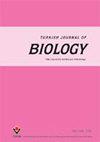Developing a label propagation approach for cancer subtype identification problem
IF 0.9
4区 生物学
Q3 BIOLOGY
引用次数: 0
Abstract
The term of cancer is used to describe diseases in which abnormal cells that grow out of control and invade other tissues. There are multiple types of cancer and many types of cancer have various subtypes with different clinical and biological implications. These differences show that diverse methods should be followed for the treatment of different subtypes of cancer. Discovering cancer subtypes is an important problem in bioinformatics, as it can help improve personalized medicine. Knowing the subtype of cancer is useful for determine the treatment steps and prognosis. Computational bioinformatics methods help performing cancer analysis to design targeted treatments by exposing the common molecular pathology of different cancer subtypes. Thus far, several computational methods have been proposed to discover cancer subtypes or to stratify cancer into informative subtypes. However, existing works do not consider the sparseness of data, and result in ill-conditioned solution. To resort this shortcoming, in this thesis, we propose an alternative unsupervised computational method to stratify cancer into subtypes using applied numerical algebra techniques. More specifically, we applied this label propagation-based approach to stratify somatic mutation profiles of colon, head and neck, uterine, bladder and breast tumors. We then evaluated the performance of our method by comparing it to the baseline methods. Extensive experiments demonstrate that our approach highly renders tumor classification tasks by largely outperforming the state-of-the-art unsupervised and supervised approaches. tiplerinin针对癌症亚型识别问题的标签传播方法研究
癌症这个术语是用来描述异常细胞生长失控并侵入其他组织的疾病。有多种类型的癌症,许多类型的癌症有不同的亚型,具有不同的临床和生物学意义。这些差异表明,治疗不同亚型的癌症应采用不同的方法。发现癌症亚型是生物信息学中的一个重要问题,因为它可以帮助改善个性化医疗。了解癌症的亚型有助于确定治疗步骤和预后。计算生物信息学方法通过揭示不同癌症亚型的共同分子病理学,帮助进行癌症分析,设计靶向治疗。到目前为止,已经提出了几种计算方法来发现癌症亚型或将癌症分层为信息亚型。然而,现有的工作没有考虑数据的稀疏性,导致了病态解。为了弥补这一缺点,在本文中,我们提出了一种替代的无监督计算方法,使用应用数值代数技术将癌症分层为亚型。更具体地说,我们应用这种基于标签传播的方法对结肠、头颈部、子宫、膀胱和乳房肿瘤的体细胞突变谱进行分层。然后,我们通过将我们的方法与基线方法进行比较来评估我们的方法的性能。大量的实验表明,我们的方法在很大程度上优于最先进的无监督和有监督方法,从而高度呈现肿瘤分类任务。tiplerinin
本文章由计算机程序翻译,如有差异,请以英文原文为准。
求助全文
约1分钟内获得全文
求助全文
来源期刊

Turkish Journal of Biology
BIOLOGY-
CiteScore
4.60
自引率
0.00%
发文量
20
审稿时长
6-12 weeks
期刊介绍:
The Turkish Journal of Biology is published electronically 6 times a year by the Scientific and Technological
Research Council of Turkey (TÜBİTAK) and accepts English-language manuscripts concerning all kinds of biological
processes including biochemistry and biosynthesis, physiology and metabolism, molecular genetics, molecular biology,
genomics, proteomics, molecular farming, biotechnology/genetic transformation, nanobiotechnology, bioinformatics
and systems biology, cell and developmental biology, stem cell biology, and reproductive biology. Contribution is open
to researchers of all nationalities.
 求助内容:
求助内容: 应助结果提醒方式:
应助结果提醒方式:


